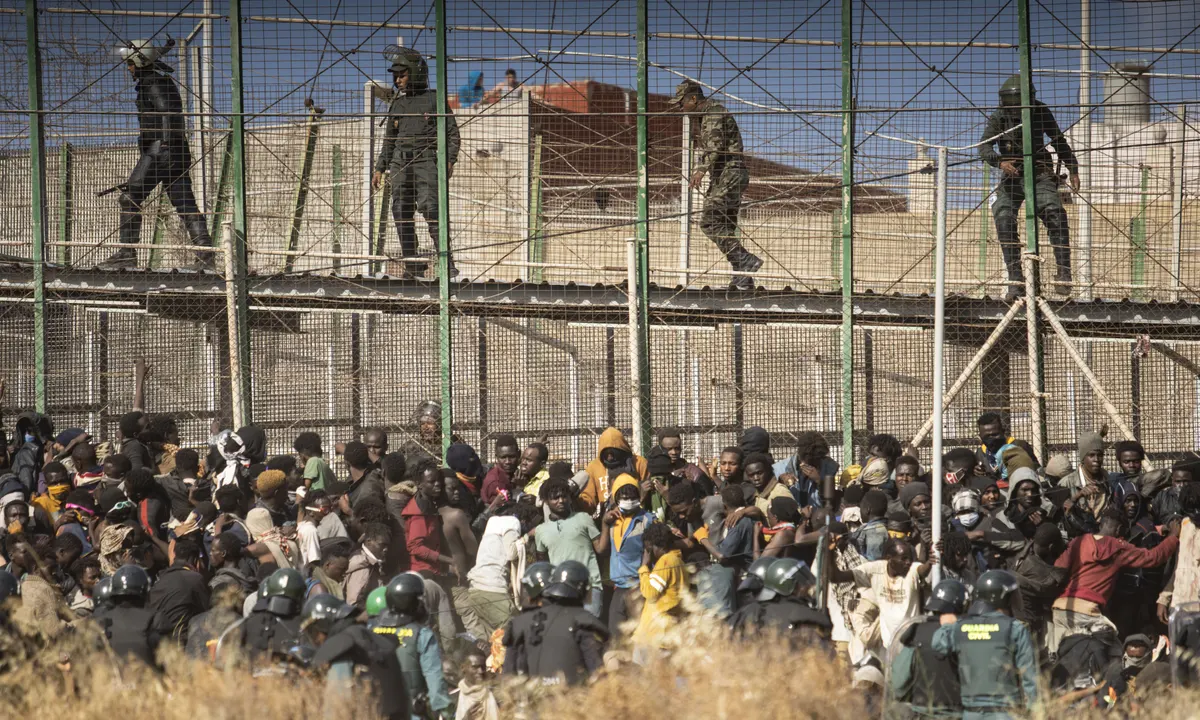
tragedy unresolved at morocco spain bord
A year has passed since the tragic incident involving the violence and deaths of asylum seekers and migrants at the border between Morocco and the Spanish enclave of Melilla. Human Rights Watch (HRW) has called attention to the victims’ unjust treatment and the lack of reliable investigations. Both Spain and Morocco have fallen short in conducting thorough investigations into the violence and holding their security personnel accountable. This article delves into the details of the incident, the response from the authorities, and the urgent need for an independent investigation to ensure justice for the victims and prevent future violations.
The Tragic Incident
Between 1,300 and 2,000 men, mostly from South Sudan, Sudan, and Chad, made an attempt to climb the 6- to 10-meter chain-link fences around the Melilla enclave on June 24, 2022. According to reports, the Moroccan government has confirmed 23 deaths; however, UN experts believe there have been at least 37 deaths, and a Moroccan human rights group says 77 people are still missing. The absence of safe and legal migration routes and the challenges encountered in approaching border posts led to the desperate attempt to cross the border.
Both Spanish and Moroccan police and border guards have been found to have used excessive force, according to the media and non-governmental organisations. The migrants and asylum seekers were attacked with rocks, tear gas and rubber bullets. Additionally, injured people on both sides of the fence were left without medical care for hours. Despite these grave accusations, both the Spanish and Moroccan investigations were flawed and led to the exoneration of their respective security forces.
Keep Reading
Plight of the Families
For families looking for their missing loved ones, the lack of access to official information and assistance has been distressing. They are hopeless since there have been no serious investigations or definitive explanations regarding what happened to their loved ones. Family members who are unable to identify whether the videos going viral on social media capture the precise minute their loved ones were present have expressed frustration over the lack of clarity. Their agony has been made worse by the government’ failure to provide necessary assistance.
A Moroccan human rights organisation claims that even though autopsies and DNA tests were performed on the bodies brought to the Nador mortuary, only one victim has been recognised and buried. Contrary to custom, relatives looking for their missing loved ones have been denied admission to the mortuary and have instead been shown pictures. The ongoing war in Sudan and travel challenges have complicated the Moroccan government’s request for DNA samples from families in Sudan to aid in the identification procedure.
Responsibility Denial and Summary Returns
Both Spain and Morocco have disclaimed ownership of the bloodshed and fatalities. The Spanish Public Prosecutor’s Office concluded its inquiry by clearing the country’s security services and only recommending disciplinary action against a select few of its members. The Moroccan government similarly cleared its security forces of any misconduct. Furthermore, in violation of EU and international law, the Spanish Guardia Civil illegally sent 470 individuals back to Morocco without following proper procedures.
Call for an Independent Investigation
Human Rights Watch has called on Spain and Morocco to launch an objective, fair, and thorough inquiry on what happened in June 2022 at the border with Melilla. Such an investigation is required to hold those accountable for violating human rights accountable and stop similar incidents from happening again. Pushbacks, group expulsions, and the use of excessive force are examples of the offences. The authorities on both sides must also work together to aid families looking for missing relatives and to promptly share information about the inquiry.
A significant human rights concern is the lack of reliable investigations and justice for the victims of violence and fatalities near the Moroccan-Spanish border. The incident highlights the urgent necessity for an impartial investigation to identify those in charge of the violations and stop them from happening again. Spain should take the lead in promoting a rights-respecting strategy that includes the establishment of safe and legal migration routes, accountability for border abuses, and stringent human rights conditions for cooperation with other nations. Spain is currently holding the Council of the EU presidency. In all migration policies and practises, it is essential to give top priority to safeguarding human rights and the dignity of migrants and asylum seekers.









